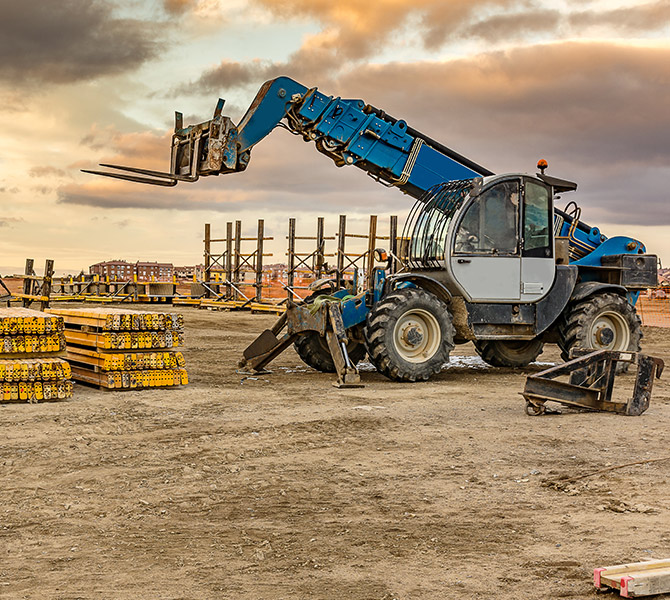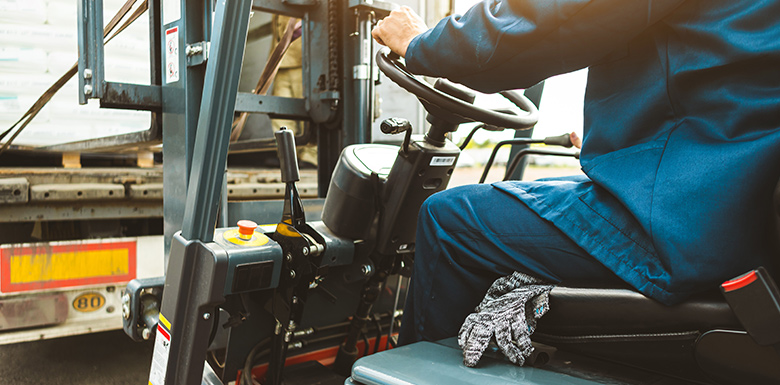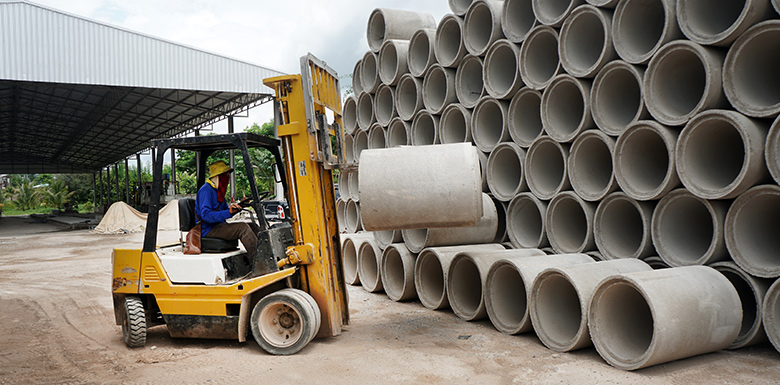NYC Forklift Accidents
Forklifts also referred to as lift trucks or powered industrial trucks, are used in many workplaces, warehouses, and construction sites to move materials, boxes, crates, pallets, and containers.
Unfortunately, many forklift drivers do not have adequate safety training to avoid dropped loads and collisions with workers on foot. Accidents involving forklifts are among the most common causes of serious injuries at workplaces where they are present.
Types of Forklifts & Forklift Accidents
There are several types of forklift accidents that can result in serious injuries or fatalities:
Tipping Over
Forklifts can tip over if they are overloaded, operated on uneven surfaces, or driven too quickly around corners. When a forklift tips over, it can crush the operator or nearby workers, leading to severe injuries or death.
Struck by Forklift
Workers on foot in the vicinity of forklifts are at risk of being struck by the vehicle, particularly if the operator fails to see them or if proper safety precautions are not followed.
Falling Objects
Forklifts are often used to lift heavy loads, which can become unstable or fall if not properly secured. Workers below are at risk of being struck by falling objects, resulting in serious injuries.
Forklifts also come in various types, each posing unique risks and hazards. Understanding these hazards is crucial for preventing accidents and ensuring workplace safety. Here are some common forklifts and their associated risks:
Electric Motor Rider Trucks
Electric motor rider trucks are commonly used in warehouses and industrial settings for their efficiency and maneuverability. However, they pose risks such as:
- Tip-over accidents: These forklifts have a higher center of gravity, making them prone to tipping over when carrying heavy loads or navigating uneven terrain.
- Collision hazards: Due to their quiet operation, electric motor rider trucks can be difficult to hear in busy work environments, increasing the risk of collisions with pedestrians or other equipment.
Electric Motor Narrow Aisle Trucks
Electric motor narrow aisle trucks are designed to operate in confined spaces, maximizing warehouse storage capacity. However, they present unique hazards:
- Limited visibility: Narrow aisle trucks have restricted visibility, increasing the risk of collisions with stationary objects, racks, or other forklifts.
- Pinching hazards: Workers may be at risk of getting caught or pinned between the forklift and narrow aisles or shelving units, especially during tight maneuvers.
Electric Motor Hand Trucks
Electric motor hand trucks, also known as pallet jacks, are commonly used for moving palletized loads over short distances. Hazards associated with these forklifts include:
- Manual handling risks: Workers may be at risk of musculoskeletal injuries due to repetitive lifting and maneuvering of heavy loads using hand-operated controls.
- Crushing injuries: Inadequate training or improper use of hand trucks can result in crushing injuries if the load shifts or falls unexpectedly.
Internal Combustion Engine Trucks with Solid Tires
Internal combustion engine trucks with solid tires are commonly used in outdoor environments and rough terrain. However, they present hazards such as:
- Overturning risks: These forklifts may be unstable on uneven surfaces or slopes, increasing the risk of tip-over accidents.
- Vibration hazards: Prolonged exposure to vibrations from rough terrain or uneven surfaces can lead to musculoskeletal disorders among operators.
Internal Combustion Engine Trucks with Pneumatic Tires
Internal combustion engine trucks with pneumatic tires are versatile and can operate both indoors and outdoors. However, they pose the following:
- Tire blowouts: Pneumatic tires are susceptible to punctures or blowouts, especially when operating in rough terrain or around sharp objects, posing risks to both operators and nearby workers.
- Visibility challenges: Dust, debris, or inclement weather conditions can obscure visibility, increasing the risk of collisions or accidents.
Electric and Internal Combustion Engine Tractors
Electric and internal combustion engine tractors are used for towing heavy loads or transporting materials over longer distances. Hazards associated with these forklifts include:
- Roll-over accidents: Tractors towing heavy loads may be prone to roll-over accidents, especially when navigating tight turns or slopes.
- Coupling hazards: Improper coupling or uncoupling of trailers can result in crushing injuries or accidents during loading and unloading operations.
Rough Terrain Forklifts
Rough terrain forklift trucks are designed for outdoor use on uneven or unpaved surfaces. However, they present hazards such as:
- Stability challenges: These forklifts may be less stable on rough terrain, increasing the risk of tip-over accidents or loss of control.
- Environmental hazards: Operating in outdoor environments exposes operators to various hazards such as extreme weather conditions, uneven terrain, or obstacles, increasing the risk of accidents or injuries.
Common Forklift Injuries
Forklift accidents can lead to a wide range of injuries for both operators and pedestrians. These injuries vary in severity and can have long-term consequences for those involved. Some of the most common injuries include:
Crushing Injuries
Crushing injuries are among the most severe and frequently encountered in forklift accidents. When a forklift tips over or collides with objects or structures, individuals may become trapped or pinned beneath the vehicle or its load. Attempting to jump clear of a tipping forklift can also result in crushing injuries if individuals land in its path or are struck by the safety guard.
These injuries often involve fractures, internal organ damage, and traumatic amputations, and they can be fatal in severe cases.
Traumatic Brain Injuries
Traumatic brain injuries are another common outcome of forklift accidents, particularly when operators or pedestrians are struck by the vehicle or its load. The impact of a collision or being thrown from a forklift can cause significant head trauma, leading to concussions, contusions, or more severe brain injuries.
TBIs can result in cognitive impairment, memory loss, mood changes, and long-term neurological deficits, requiring extensive medical treatment and rehabilitation.
Amputations
Forklift accidents involving heavy loads or machinery can result in traumatic amputations of fingers, hands, feet, or limbs. The sheer force and weight involved in these incidents can cause irreversible damage, requiring immediate medical attention and long-term rehabilitation.
Musculoskeletal Injuries
Operators and pedestrians involved in forklift accidents may experience musculoskeletal injuries due to falls, impacts, or being caught between objects. These injuries often affect the spine, neck, shoulders, and limbs, resulting in sprains, strains, dislocations, or fractures.
Improper lifting techniques, repetitive motions, and overexertion while operating or working near forklifts can also contribute to musculoskeletal disorders over time, such as back pain, tendonitis, or carpal tunnel syndrome.
Soft Tissue Injuries
Soft tissue injuries, including cuts, lacerations, and bruises, are common in forklift accidents involving contact with sharp objects, protruding edges, or moving machinery. Operators and pedestrians may sustain injuries from being struck by forklift forks, falling debris, or colliding with stationary objects or equipment.
While soft tissue injuries are often less severe than fractures or internal injuries, they can still cause significant pain, discomfort, and impairment, requiring prompt medical attention and wound care.
Forklift Pedestrian Accidents
Forklift accidents involving bystanders and pedestrians are also a serious safety concern, particularly when operators fail to follow proper safety protocols or drive at excessive speeds. Pedestrians may be struck by forklifts while walking in designated work areas, loading docks, or storage aisles, leading to various injuries ranging from minor bruises to severe trauma.
Proper training, signage, and designated pedestrian walkways can help mitigate the risk of pedestrian accidents and enhance overall workplace safety.
Psychological Trauma
Experiencing a forklift accident can have lasting psychological effects on individuals, including PTSD, anxiety, and depression. Emotional support, counseling, and debriefing sessions may be necessary to address the psychological impact of traumatic events and promote recovery.
Fatal Forklift Injuries
Fatal forklift injuries, including impalement incidents, represent the most tragic outcome of forklift accidents. Despite safety measures, such as safety guards, fatalities underscore the need for rigorous safety training and adherence to protocols. In cases of wrongful death, families may pursue legal action to seek accountability and compensation for their loss.
NY Forklift Safety & Training
Forklifts often operate in fast-paced workplaces, and they lift extremely heavy loads that can sometimes obscure the vision of the driver. OSHA requires forklift operators to slow down and sound a horn at cross aisles and other locations where their vision is obstructed.
New York requires that every person who operates a forklift has an operator’s license and receives adequate training before taking control of the forklift. Employers must ensure that operators have proper training. Yet, poor operator training and disregard for safety guidelines contribute to most accidents caused by forklifts.
Forklift operators who have not received proper training in the operation of motorized industrial trucks pose a hazard to other workers. For example, a forklift operator who hasn’t received training in loading cargo on a forklift may try to move an unbalanced load, causing it to topple. Too often, however, employers allow workers to operate forklifts without proper training.
Tell Us What Happened
"*" indicates required fields


